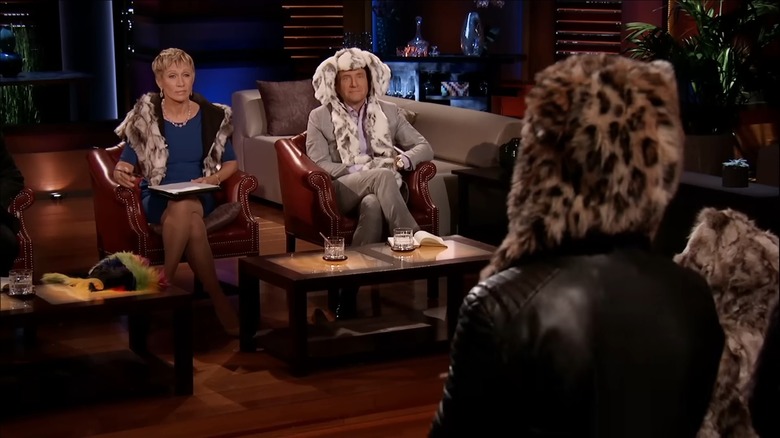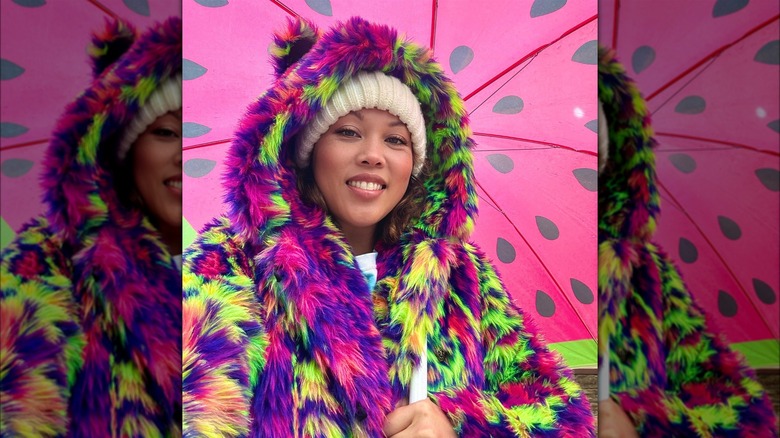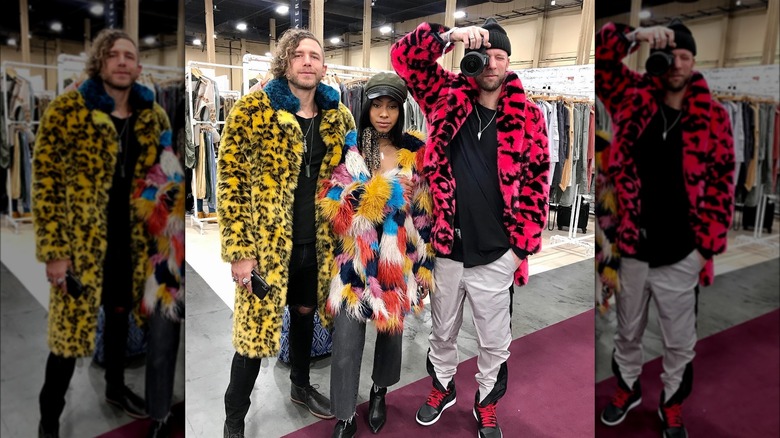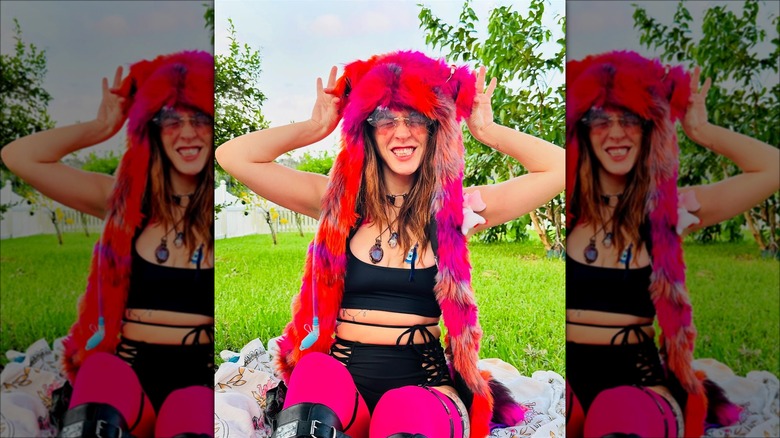Here's What Went Down With SpiritHoods After Shark Tank
When four friends founded SpiritHoods in 2010, they were determined to make faux fur fashionable. The company produced fluffy hats with integrated gloves that combined fashion and functionality, but also gave back via a 10% donation of profits to endangered animal charities. "We used to make fun monster hoods for Burning Man before we launched the company. One day we took one out for a night on the town and not only was it a wild experience, we had a dozen offers to buy the hat off of us," co-founders Latif Hamilton and Marley Marotta told Voyage LA in 2017.
Another founder, Alexander Mendeluk, told Under 30 CEO that he initially worked part-time on the business, but focused on it full-time after seeing rapid expansion. "As SpiritHoods matured and I matured, I realized that there was more opportunity and a better route as an entrepreneur than an actor. It came down to being able to control your own destiny," he said.
It wasn't long before SpiritHoods really took off, with the likes of Justin Bieber, Kesha, and Vanessa Hudgens sporting the hats. To keep up with the newfound attention, the group spent serious money expanding the company and upping its headcount. But big growth meant big risk, and the founders knew they needed to get their products in front of more people and investors. So they took the idea to "Shark Tank."
SpiritHoods couldn't reach a deal on Shark Tank despite getting an offer
Marley Marotta and Alexander Mendeluk wanted $450,000 for 15% equity in SpiritHoods when they appeared on "Shark Tank" in 2013. The co-creators began in a fun way, arriving with dancers and presenting the Sharks with their signature hats. What impressed the Sharks most, though, was the company's lifetime sales figure of $9.3 million. "They don't look so stupid now," Kevin O'Leary quipped.
But things got rocky after that. As the group talked numbers, the Sharks weren't impressed when Marotta and Mendeluk admitted they'd lost $500,000 the year prior after expanding too rapidly. The Sharks then questioned how unique the product was and Daymond John grilled Marotta and Mendeluk on exactly what they wanted the investment for. The co-founders explained they could use the money to clear their debts, but also wanted to grow the business further. However, not everyone was convinced.
Mr. Wonderful was first to declare himself out and Robert Herjavec quickly followed. Herjavec said he'd already invested in a similar business that didn't work out, and wasn't confident SpiritHoods would be different. Barbara Corcoran and Mark Cuban also rejected a deal. Daymond John was intrigued, offering to invest for 50% equity and the right to license SpiritHood's products. The hopefuls attempted to negotiate and counter-offered at 22.5% plus an undisclosed percentage of any licencing deals. But Marotta and Mendeluk were left blindsided when John told them he had "buyer's remorse" before even putting any money down. "I wasn't ready to re-negotiate the deal. I'm out," he said. The co-founders left "Shark Tank" with nothing.
SpiritHoods raised funds elsewhere after Shark Tank
The SpiritHoods co-founders didn't let a lack of investment slow them down. In fact, the company kept growing. Between 2018 and 2021, the company's gross revenue increased 63% and, in 2019, it teamed up with Impact to create a new marketing strategy. That helped it up revenue by 99% in early 2020 compared to early 2019. "Even as the impacts of COVID-19 began closing down commerce across the world, we were able to streamline our budgets, reduce spend, and increase revenue at a time when many other companies could not," Marley Marotta told Impact.
Three years later, SpiritHoods was ready to raise funds again. In 2022, the company launched a Start Engine crowdfunding campaign. SpiritHoods hoped to raise more than $1 million with a business valuation of $15 million and a lifetime revenue of $36 million. The company didn't reach the seven-figure investment it hoped for, but amassed about $109,523 from 139 investors. The investment came at the perfect time, as fluffy accessories became super trendy the following year.
SpiritHoods is still in business after big changes
SpiritHoods is still selling as of October 2024, but with some changes at the top. Alexander Mendeluk left the company in 2016 and went on to found a healing center in Bali, Indonesia called The LightForce Center, where he still works at the time of writing. Fourth co-founder Ashley Haber parted ways with his fellow business partners in 2014 and has pursued a career as photographer and creative director. Marley Marotta exited the company in 2023, leaving Latif Hamilton as the president of SpiritHoods. Hamilton has held the position of president, principal accounting officer, and director since 2022.
The company offers a wide range of products, including men's and women's coats, hats, and loungewear. It's also expanded into homeware, offering the likes of blankets, pillow cases, and slippers. SpiritHoods once sold via Amazon, but its products are no longer available at the retailer. Marley Marotta and Alexander Mendeluk claimed during their "Shark Tank" pitch that SpiritHoods was sold via Nordstrom online, Zappos, and Harrods, but today it only sells via its official website. According to ZoomInfo, the business has less than 25 employees with revenue of $5.2 million.
SpiritHoods has a strong social media presence but announced a price rise for 2024
SpiritHoods continues to have a strong presence on social media and regularly shares content with its customers. On Instagram, the company boasts 164,000 followers, plus more than 2,000 followers on TikTok and 274,000 followers on Facebook. It regularly posts photos and videos of customers wearing SpiritHoods products, encouraging them to use the hashtag #SpiritHoods to expand its reach.
Social media appears to be a driving force for SpiritHoods. Alexander Mendeluk told Entrepreneur in 2012 that it helped the business build a loyal following. "[Social media is] really about connecting with fans on a personal level. It's about finding content that relates to the brand and to our community. People don't want to be sold to, especially on Facebook," he said. "We never fail to pay attention to our online community. Facebook alone drives half of our online traffic," he added.
But SpiritHoods has also adapted its strategies to stay in business. In January 2024, on its website, the company announced it was raising the prices of its products. "We find ourselves in a difficult situation lately and find no way around it, but to increase our prices," the statement read, citing rising material prices, increased labor costs, and legal fees. "We will continue to find ways to keep our costs down so that we can continue doing what we love so much," it added.



